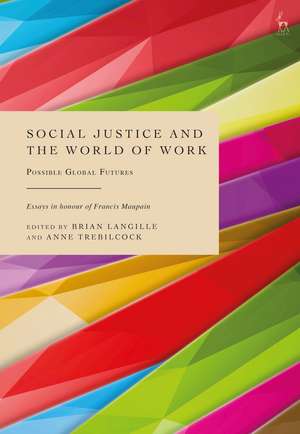Social Justice and the World of Work: Possible Global Futures
Editat de Brian Langille, Anne Trebilcocken Limba Engleză Paperback – 28 aug 2024
| Toate formatele și edițiile | Preț | Express |
|---|---|---|
| Paperback (1) | 349.13 lei 3-5 săpt. | |
| Bloomsbury Publishing – 28 aug 2024 | 349.13 lei 3-5 săpt. | |
| Hardback (1) | 662.51 lei 6-8 săpt. | |
| Bloomsbury Publishing – 22 feb 2023 | 662.51 lei 6-8 săpt. |
Preț: 349.13 lei
Preț vechi: 478.19 lei
-27% Nou
Puncte Express: 524
Preț estimativ în valută:
66.83€ • 72.61$ • 56.17£
66.83€ • 72.61$ • 56.17£
Carte disponibilă
Livrare economică 31 martie-14 aprilie
Preluare comenzi: 021 569.72.76
Specificații
ISBN-13: 9781509961290
ISBN-10: 1509961291
Pagini: 480
Dimensiuni: 169 x 244 x 25 mm
Greutate: 0.64 kg
Editura: Bloomsbury Publishing
Colecția Hart Publishing
Locul publicării:London, United Kingdom
ISBN-10: 1509961291
Pagini: 480
Dimensiuni: 169 x 244 x 25 mm
Greutate: 0.64 kg
Editura: Bloomsbury Publishing
Colecția Hart Publishing
Locul publicării:London, United Kingdom
Caracteristici
Responding to the pandemic and other global shocks, the essays analyse the most critical problems and opportunities for global social justice at work and present concrete ideas for progress
Notă biografică
Brian Langille is Professor of Law at the University of Toronto, Canada.Anne Trebilcock is associated with the Institute of Labour Law, University of Göttingen, Germany, and is former ILO Legal Adviser/Director of Legal Services.
Cuprins
Introduction: A Framework for Thinking about the Future of Social JusticeBrian Langille (University of Toronto, Canada) and Anne Trebilcock (University of Göttingen, Germany)PART IGOALS AND CHALLENGESA. Clarifying the Idea of Social Justice in Work1. Globalisation or 'Mondialisation'? Taking Social Models SeriouslyAlain Supiot (College de France, France)2. Social Justice and Reform of CapitalismAdalberto Perulli (Ca' Foscari University, Italy)3. Learning from the Past for the Future of International Labour LawAdelle Blackett (McGill Law School, Canada)4. Two Institutional Paths Toward the Future of Work - A View from the Edge of the FieldKerry Rittich (University of Toronto, Canada)5. International Axiologies for Social Justice at the International Labour Organization: Value-based Perspectives and Ways ForwardJordi Agustí-Panareda (International Labour Organisation, Switzerland)6. 'A Just Share of the Fruits of Progress': What Does It Mean?K D Ewing (King's College, London, UK) and Lord Hendy KC (Barrister, UK)B. Critical Dimensions of the Global Future of Social Justice in Work7. International Environmental Law and Social Justice: On EncountersLaurence Boisson de Chazournes (University of Geneva, Switzerland)8. Sustainability as a Guide for the Future Development of International Labour Law?Tonia Novitz (University of Bristol, UK)9. On the Irrelevance of Citizenship in the House of LabourAlan Hyde (Rutgers University Law School, USA)10. Restrictive Visa Schemes and Global Labour JusticeVirginia Mantouvalou (University College London, UK)11. Persistent Gender Gaps: Past Priorities, Future Prospects for the Pursuit of Equality in the World of WorkShauna Olney (International Civil Service Commission, Canada)PART IIMEANSA. International Institutions and the Future of Global Labour Justice I. The International Labour Organization 12. The Past and Future of Governance: Epistemic Authority and the ILOJan Klabbers (University of Helsinki, Finland)13. The Resilience of Multilateralism: An ILO Introspection for a System-wide VisionTomi Kohiyama (International Labour Organization, Switzerland) and Thomas Lieby (International Labour Organization, Switzerland)14. The Contemporary Quest for Social Justice: Some Further Thoughts on the ILO ContributionJean-Michel Servais (University of Gerona, Spain)15. The Impact of the Standards Review Mechanism on the Future of International Labour Standards: Not Even Diamonds are ForeverClaire La Hovary (International Labour Office, Switzerland) 16. Is the ILO a Legitimate Global Institution?Supriya Routh (University of British Columbia, Canada)II. The World Trade Organization and the Trade and Labour Nexus17. Reforming the WTO to Better Promote Social JusticeSteve Charnovitz (George Washington University, USA)18. A Tale of Tripartism, a Tribunal and TradeDesirée LeClercq (Cornell University, USA)III. The Potential of Regional Systems19. Achieving Social Justice through Investor-related Labour Obligations? Brief Insights from the African Investment Treaty PracticeMakane Moïse Mbengue (University of Geneva, Switzerland)20. A Regional Revitalisation of Labour Rights? The Emerging Approach of the Inter-American Court of Human RightsFranz Christian Ebert (Max Planck Institute of Comparative Public and International Law, Germany) 21. Social Sustainability and Labour rights in a Resilient EUBruno Caruso (University of Catania, Italy) and Veronica Papa (University of Catania, Italy) B. Possible Futures of Global Labour Justice by Other Means: Public and Private Actors 22. Peeling the Onion: On Choices Judges Make in Transnational Labour LitigationJudy Fudge (McMaster University, Canada) and Guy Mundlak (Tel Aviv University, Israel)23. The Use of Arbitration to Resolve Transnational Labour DisputesKaterina Yiannibas (Columbia Law School, USA)24. Buying beyond our Borders: Public Procurement and Labour Rights in Global Supply ChainsOlga Martin-Ortega (University of Greenwich, UK) and Martina Trusgnach (University of Greenwich, UK) 25. EU Trade Preferences and Human Rights in MyanmarRichard Horsey (independent expert, Myanmar)26. The Future of Health and Safety at Work as a Fundamental Principle and Right: Will it meet ISO and UN challenges?Isabelle Daugareilh (University of Bordeaux, France)C. 'Labour Law Itself' and the Future of Global Social Justice27. On Social Justice and Artificial Intelligence: Trade Unions as Instruments for the Dissemination of Transnational NormsJulia López López (Pompeu Fabra University, Spain) and Eusebi Colàs Neila (Pompeu Fabra University, Spain)28. It's About Time - Gender, Justice and Working Time Regulation in Employment and Care WorkKirsten Scheiwe (University of Hildesheim, Germany)29. Epistemic Secrets of Labour Law: Towards a Decolonial TurnFlavia Souza Máximo Pereira (Federal University of Ouro Preto, Brazil) and Pedro Augusto Gravatá Nicoli (Federal University of Minas Gerais, Brazil)30. After 'Subsistence Work': Labour Commodification and Social Justice in the Household WorkplaceLiam McHugh-Russell (Dalhousie School of Law, Canada)31. Social Justice for an Ongoing Theoretical Reconfiguration of Labour LawAdrián Goldin (University of Buenos Aires, Argentina) Publications of Francis Maupain
